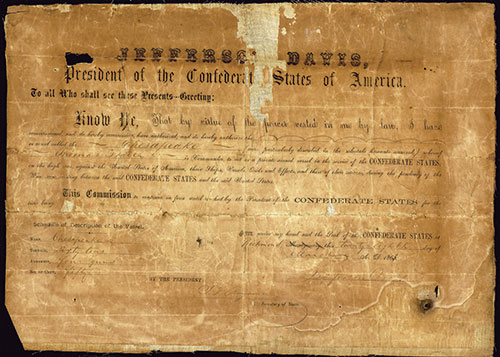
Auction: 318 - The Collector's Series
Lot: 1527
Davis, Jefferson; Benjamin, Judah P. Letter of Marque. Partly printed Document signed "Jefferson Davis" as President. Signed "J. P. Benjamin" as Secretary of State. Issued to the 60-ton schooner "Chesapeake," four guns, crew of fifty, Captain Thomas Smith. Partially Printed Document, 16 ½" x 12", mounted on cloth. There are internal fold splits, four small body holes, and one large piece missing near the center at the top. The entire document looks as if it was rescued from a fire, as smoke and water stains are evident throughout. Despite these impairments, most of the printed text, and all of the hand written entries including the signatures are intact and legible.
Jefferson Finis Davis (1808 -1889) was a United States soldier and statesman, and President of the Confederate States of America during the entire Civil War. He was a West Point graduate and fought in the Mexican-American War. Davis served as the United States Secretary of War under Franklin Pierce, and as a Democratic U.S. senator from Mississippi. As a senator, he argued against secession, but agreed that each state was sovereign and had an unquestionable right to secede from the Union. After his capture in 1865, he was accused of treason, but was not tried and was released after two years.
Judah Philip Benjamin (1811 - 1884) was an American politician, lawyer, and slaveholder. He served in cabinet level positions in the Confederate States of America, including Secretary of War and Secretary of State. Benjamin was a member of the Louisiana House of Representatives, he was elected by the state legislature to the US Senate from Louisiana, becoming only the second Jewish senator in U.S. history. In 1861, he was appointed by President Jefferson Davis to three different Cabinet posts in his administration. Benjamin was the first Jewish appointee to a Cabinet position in a North American government, and the first Jewish American to be seriously considered for nomination to the U.S. Supreme Court.
Thomas Smith, the captain of the Chesapeake, was a Baltimorean who had suffered losses he attributed to the United States. He wished to send out his armed schooner to affect reprisals.
The Chesapeake was one of the last ships to receive a letter of marque.
This letter of marque was literally a license, granted by the Confederate States of America, to engage in privateering, the practice of fitting ordinary merchant vessels with modest armament and sending them to capture other, unarmed merchant vessels. Captured vessels were to be taken to the nearest court, and if the court ruled that the capture was legitimate, the ship and cargo were sold at auction. The proceeds were then distributed among owners and crew.
The historical significance of this example may be appreciated in light of the fact that just five days after the bombardment of Fort Sumter, Jefferson Davis issued a proclamation inviting, "all those who may desire, by service in private-armed vessels on the high seas, to aid this Government in resisting so wanton and wicked an aggression, to make application for commissions or letters of marque and reprisal to be issued under the seal of these Confederate States." Confederate Congressional authorization was granted by an act signed on May 6, 1861.
Although the condition of the document leaves something to be desired, this is the only issued Confederate Letter of Marque this cataloger is aware of.
Sold for
$2,100




